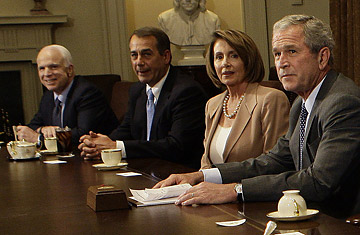
Republican presidential candidate John McCain, Represenative John Boehner and House Speaker Nancy Pelosi join President Bush at the White House for discussions on the bailout package on Thursday.
With those two distracting presidential contenders down in Mississippi for their first debate and safely out of the picture, negotiators for all sides started the weekend ready to get back to work on a package to rescue the ailing financial system. But what confronts the members of Congress trying to craft an agreement is a more confusing array of options than before.
The key players at this point are House Republicans — a group that normally is all but irrelevant on Capitol Hill. Speaker Nancy Pelosi — mindful of the electoral disaster that befell her party after it passed Bill Clinton's controversial budget plan in 1993 without any GOP votes — has said she will not bring any markets stabilization package to the floor without a majority of House Republicans on board. With constituent telephone calls to congressional offices running 100 to 1 against the proposed $700 billion Bush Administration bailout plan, the last thing Pelosi wants to do is force her own members to walk the plank for the proposal without a significant amount of company (and cover) from the other side of the aisle. But hours after Congressional Republicans and Democrats announced the outlines of a deal on Thursday afternoon, House Republicans made clear at the White House gathering with John McCain, Barack Obama and President Bush that they were not on board with the bipartisan plan.
Instead, they are now actively pushing an alternative proposal floated by Congressman Eric Cantor of Virginia that would force Wall Street to pony up some cash at the outset. Rather than buying all those troubled mortgage assets from ailing banks and investment firms, Republicans say, the government should instead insure them, much as the Government National Mortgage Association does. This approach, they argue, would not cost as much, and would require Wall Street to pay the cost of its mistakes, through insurance premiums. "The main thing is to protect the taxpayer," said Georgia Republican Phil Gingrey. "We don't really feel like there's a gun held to our head to get this accomplished by a drop dead time."
But while the Bush Administration bailout plan does require an unprecedented outlay of taxpayer funds, White House officials say the cost of a crippled economy would be an even greater burden on average Americans. Treasury Secretary Henry Paulson believes that while the House Republican proposal would help moderate the current crisis, it wouldn't be enough to do the job. Nor is it the most effective way, Treasury officials argue. Leaving those toxic mortgage-backed assets on financial institution balance sheets, they say, would not provide the additional liquidity that banks desperately need right now to get the nation's paralyzed credit markets flowing again. They also believe that it is largely unworkable because it would not help solve the problem banks are struggling with now — how to value those distressed securities.
House Republicans haven't been dissuaded yet, however, and they added a new high-ranking negotiator to the talks Friday: Minority Whip Roy Blunt. As the Republicans' chief vote-counter in the House, Blunt comes to the table with a keen sense of what will and what won't pass muster with Republican members. Shortly before the talks resumed, House Minority Leader John Boehner sent Pelosi a letter making it clear that his members will not back down from their insistence that the proposal undergo a major redesign. "If such consideration is not given, a large majority of Republicans cannot — and will not — support Sec. Paulson's plan," Boehner wrote. "In the interest of the men and women we represent in Congress, I hope it does not come to that conclusion."
Boehner's resistance had been blamed as the reason that Thursday's high-profile White House meeting had broken up in disarray. And Boehner on Friday wasn't apologizing for his refusal to go along. "If they thought they were rolling me," he said, "they were kidding themselves."
